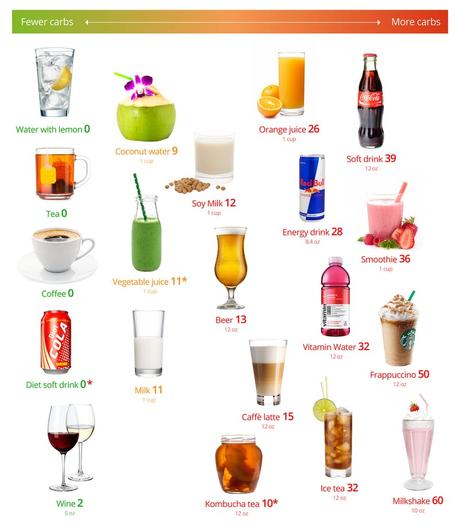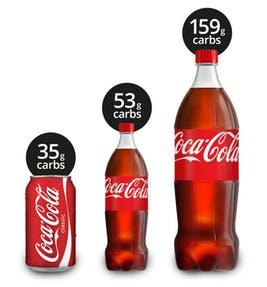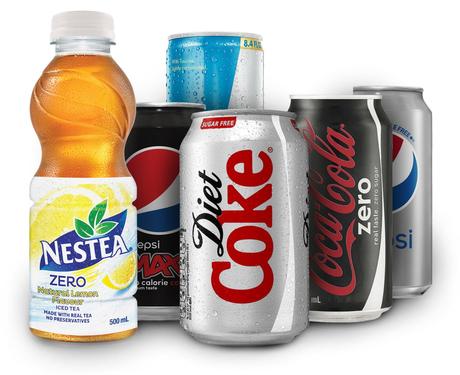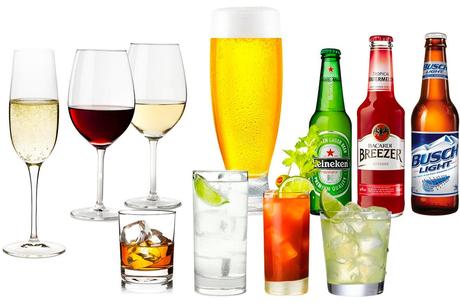Thirsty on the keto diet? Keeping well hydrated is important to feel your best. What are the best drinks? What drinks should you avoid?
Simple tip: water is wonderful. Whether flat or sparkling, it has no carbs and is a great thirst-quencher. Add a sprinkle of salt if you have keto flu or a headache.
Another great choice is tea or coffee - but don't add sugar! An occasional glass of wine is okay, too.
This visual guide depicts the best and worst options.

The numbers are the grams of net carbs in a typical serving, such as the size served in a restaurant or amount packaged in a typical can or bottle.
Drinks with green numbers are good keto options. Drinks with asterisks have some special caveats. Read on for details.
Regarding coffee or tea: just one teaspoon of sugar (one cube) is 4 grams of carbs, which makes it hard to stay below keto's 20 grams of carbs a day.
 Size matters
Size matters

Drinking a sugary soft drink on a keto diet is never a good idea, but size truly matters. A large bottle (i.e 33 ounces or 1 liter or more) has more carbs than almost an entire week's keto allowance.
A can of soda can kick you out of ketosis for a day, but a large bottle may prevent ketosis for a number of days or even a week.
If you have diabetes or insulin resistance, avoid all sugary soft drinks in order to keep your blood glucose stable and insulin levels low.
 Diet sodas - yay or nay?
Diet sodas - yay or nay?

Over the last 40 years, diet sodas - without calories or carbs - have had a huge market around the world, promoting the idea that you can have a sugary-tasting beverage without any of the harms and consequences of real sugar. Alas, it is not that simple.
Sweetened with artificial products like aspartame, sucralose, acesulfame K or refined stevia, these diet drinks are not necessarily helpful for sustained weight loss or improved health.
Their problems include maintaining cravings for sweet tastes, which can undermine keto progress and keep sugar addictions in place. Acting on the same taste bud sensors as real sugar, they blunt the ability to taste the natural flavors and sweetness of real food. Some sweeteners, such as sucralose, can still cause a blood glucose and insulin response and contribute to fat storage. Observational studies show that drinking diet soft drinks is associated with higher BMIs and higher rates of cardiovascular disease.
Other studies have noted that their long term impact on many health factors is still unknown, but that they may alter many body processes, such as metabolism, brain reward systems, appetite regulation, and the microbiome.
Studies supporting the use of diet soft drinks in weight loss programs are often conducted by the diet drink industry. A 2017 study found that much of the research on artificial sweeteners has been funded by industry and features conflict of interest, research bias, and positive results that cannot be reproduced.
Granted, drinking diet soda is likely better than drinking sugary soda. However, if you can cut both out of your daily beverage habits, your health and waistline will likely thank you.
Learn more about artificial sweeteners
 Alcohol on keto: yea or nay?
Alcohol on keto: yea or nay?

Unlike most diets, which usually forbid all alcohol, the keto diet allows moderate consumption of specific alcoholic beverages.
Dry red and white wine is fine in moderation. Beer is generally not okay - it is liquid bread - but there are a few low carb beers that can be consumed from time to time. And spirits - like vodka, gin or whiskey - have no carbs at all.
Check out all the various alcoholic drinks that are keto in our full keto alcohol guide

